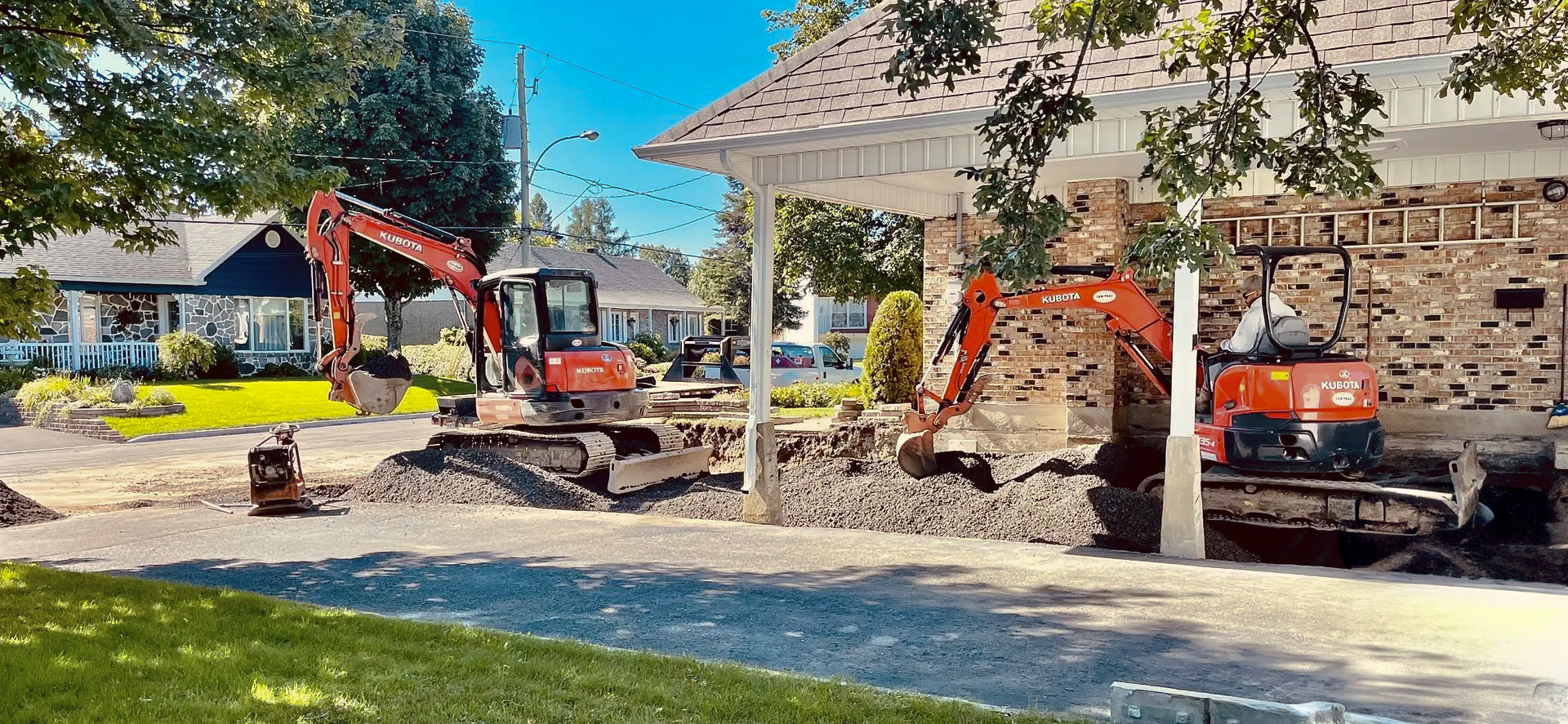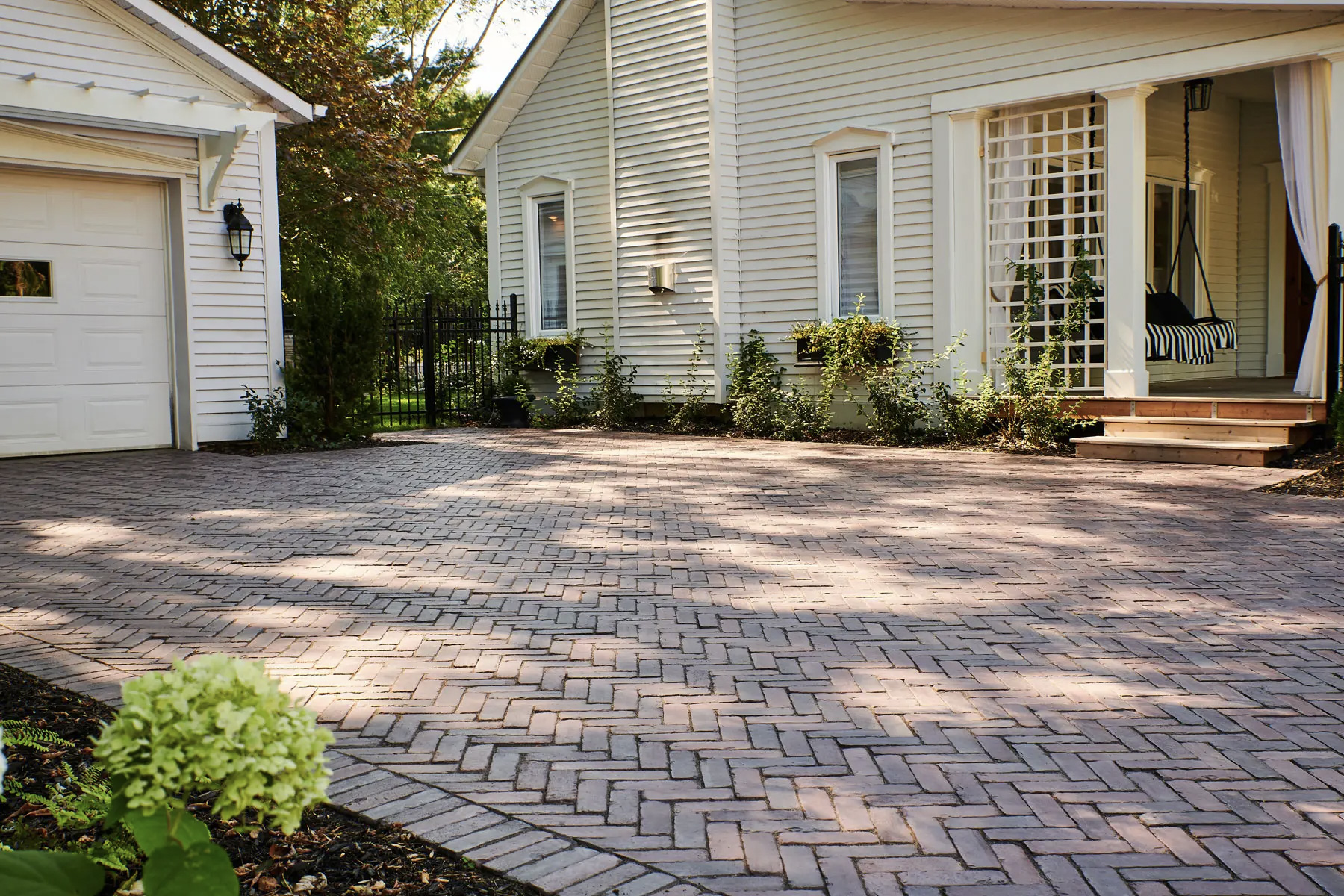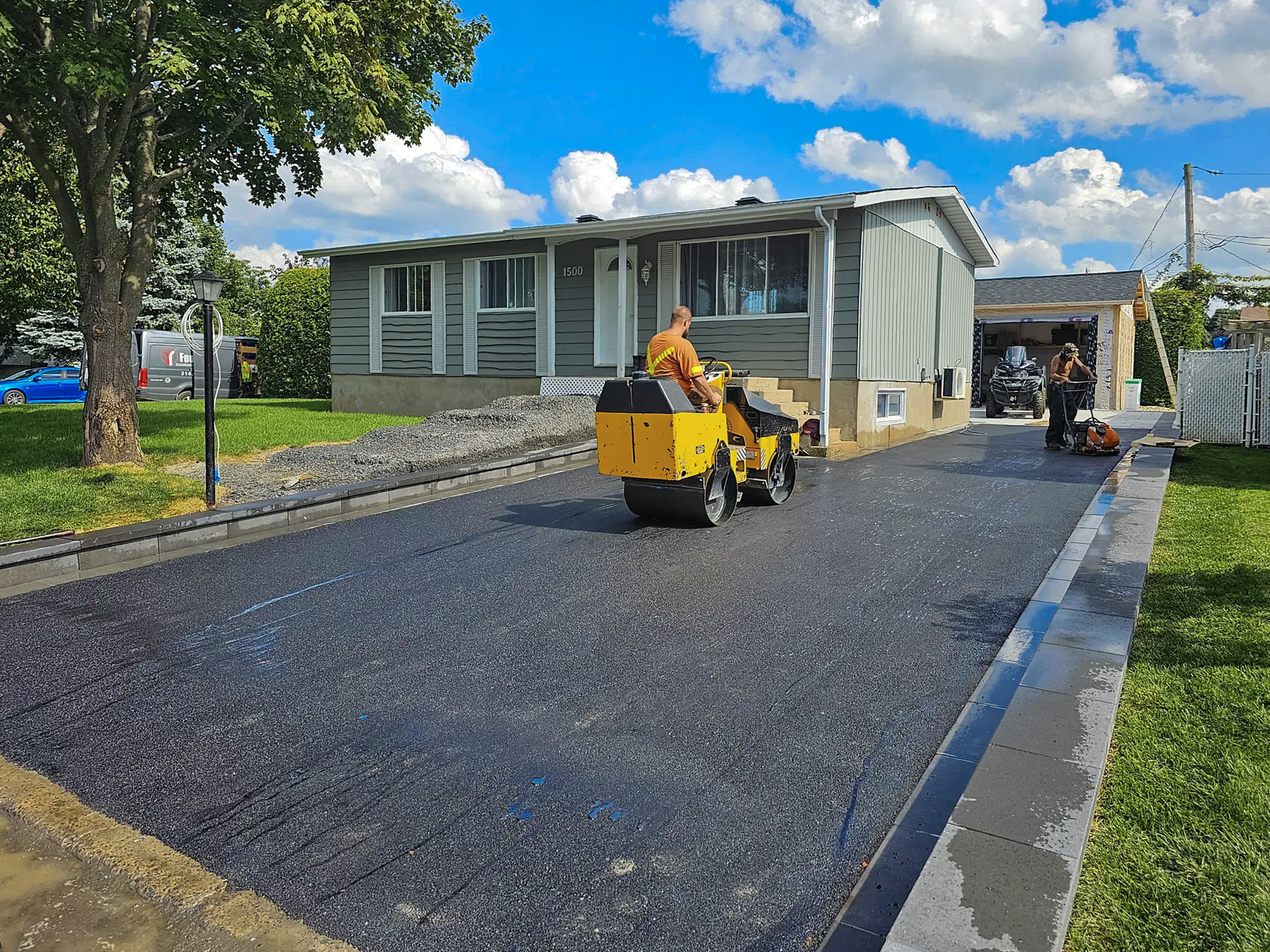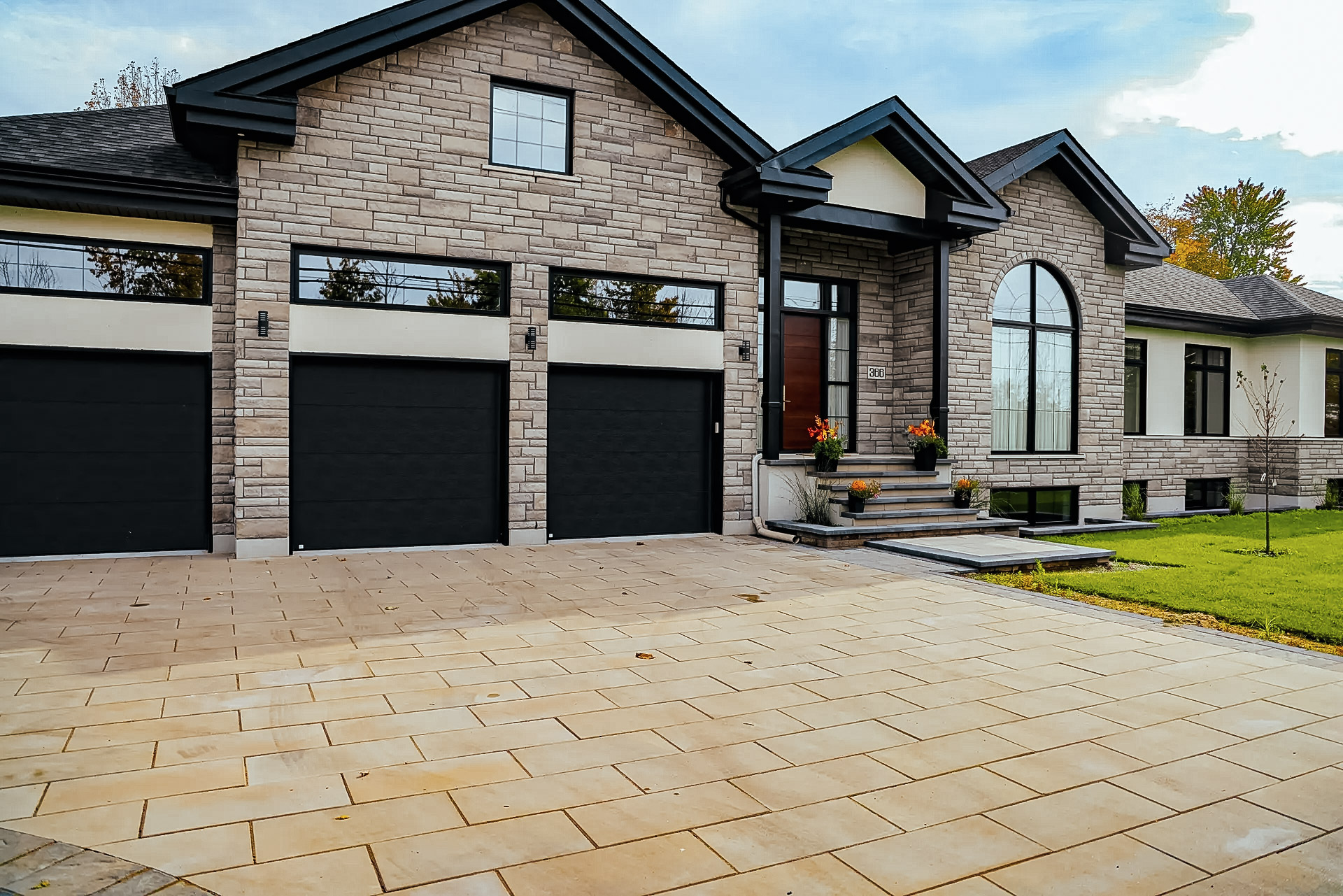The Ultimate Driveway Paving Cost Guide: How Much to Budget in 2026?
By Editorial Team
Updated on January 26, 2026

A driveway’s paving goes through a lot of daily wear and tear on account of vehicle traffic, temperature changes, and the damaging consequences of freeze-thaw cycling. While some materials last longer than others, there comes a time when repairing your driveway becomes indisputable.
Get Your Project Started Today
Submit your details and receive three free quotes from trusted contractors.
What materials should you favour to ensure durability and curb appeal? What are the advantages and disadvantages of each option? This article gives you a sneak peek into the most sought-after driveway paving materials, guiding you toward the best project-based option.
How Much Does It Cost to Pave a Residential Driveway? Asphalt, Concrete, and Pavers

Source : Pavage Excellence Inc.
Driveway Material Options | Average Cost |
Gravel | $1–$4 per square foot |
Asphalt | $3–$20 per square foot |
Concrete | $7–$20 per square foot |
Paving stones | $10-$30 per square foot |
* The pricing listed above varies based on several factors, such as square footage, quality of material, region, and contractor. So it’s up to you to choose what suits your driveway best…and, let’s be honest, your budget too! Once you’ve made up your mind, let your contractor know what kinds of vehicles are regularly found in your driveway. It may affect the required asphalt or concrete thickness.
Affordable Option : How Much Is Gravel Per Square Foot?
Gravel is one of the most cost-effective paving options, making it an attractive choice for tight budgets or large properties. Easy to install and repair, this material offers good water permeability, helping to reduce the risk of pooling. However, unlike concrete or asphalt, it requires more frequent maintenance, such as filling in areas dug out by tires or removing weeds.
Average cost is $1 to $4 per square foot.
Step-Up Option: How Much Does a Crushed Stone Driveway Cost?
A crushed stone driveway is a step up from gravel, offering a more stable and refined surface while still being budget-friendly. Because the stones are angular, they compact better and shift less under vehicle weight compared to rounded gravel. This makes crushed stone a longer-lasting option that still drains well and resists pooling.
Homeowners also like crushed stone for its variety of sizes and colors, which allows for a more tailored look than plain gravel. The tradeoff is that it still requires occasional raking, edging, and topping off over time to maintain appearance and stability.
The average cost is $2 to $5 per square foot.
Mid-Range Options
How Much Is Asphalt Per Square Foot?
Asphalt is an affordable paving option. If it has a decent crushed stone aggregate foundation, it can last up to 20 years. However, asphalt is more high maintenance than concrete.
Average cost is $3 to $20 per square foot.
How Much to Repave a Driveway with Concrete?
Made with sand, cement, and aggregate, concrete is poured on the spot, inexpensive, and makes for very appealing results. When paving with concrete, there are various colours and patterns to choose from. Let your imagination run wild!
Prices range from $7 to $20 per square foot.
High-End Option: How Much Is It to Pave with Paving Stones?
Not unlike concrete, pavers are made with sand, cement, and aggregate and boast a similar lifespan. However, pavers allow for a wide range of options when it comes to textures to embellish your drive. Even though installation is a bit more expensive, in the long run, it’ll be cheaper. If well-maintained, driveway pavers can last up to 30 years. Note that pavers are installed one by one, so if the ground is to shift, individual pavers can be removed to relevel the base. Once fixed, simply reposition the pavers.
To save a bit of money without compromising curb appeal, you can limit your driveway to specific stone-paved sections since asphalt is a lot cheaper.
Prices range from $10 to $30 per square foot, depending on the type of paver.
No matter the selected material, it’s important to choose a decent driveway drainage system, and the hired contractor must ensure that there’s a 2% slope to prevent water from pooling on the surface, especially after periods of heavy rainfall.
Heavy pooling may be a telltale sign of a damaged driveway, whether the drainage system or paving material is at fault. In the long run, it could lead to more serious problems.
What Factors Affect Driveway Paving Option Prices?

Source : Groupe Richer
Paving Material Selected
The paving material you choose will significantly impact your driveway’s cost and performance. Options like asphalt, concrete, and pavers have unique advantages and price points. Asphalt tends to be the most cost-effective choice, making it an appealing option for those looking to minimize upfront expenses as much as possible. However, concrete provides exceptional durability and longevity, which often translates into lower upkeep costs over time. Pavers, while generally more costly, have a unique aesthetic appeal that can revamp the look of your property for greater curb appeal.
Labour
Labour is another crucial factor to consider when planning your driveway paving project. Labour costs can vary based on the installation complexity and the area in which you live. Hiring qualified experts is essential to guarantee a proper and safe installation, especially since a failed attempt could lead to problems down the line, including costly repairs.
Shape and Size
The shape and size of your driveway will also have a significant impact on the project’s overall cost. Bigger driveways will, without a doubt, require more materials and labour. Also, differing shapes and slopes may necessitate more planning and preparation, which can lead to additional fees. As a result, it’s important to plan your driveway’s layout meticulously to optimize both curb appeal and budget.
Drainage
Integrating a proper drainage system into your paving project is paramount to prevent water build-up issues and guarantee your driveway’s durability. Decent drainage prevents landscape erosion, retaining its structural integrity.
What Are the Additional Costs?

Source : Pavage Sealtec
Maintenance and Replacement Costs
Your driveway’s upkeep will be another aspect to consider. After years of use, cracks are likely to coat its surface, begging to be filled in, whereas pavers can break and need replacing. Regular maintenance means preserving your drive’s integrity, preventing costly repairs, and ensuring constant curb appeal.
Site Preparation
Site preparation can lead to extra fees, as it often involves additional time and labour. For example, if the current material needs to be removed before laying the new one, it calls for demolition work and debris removal, extending the project’s timeframe.
Protective Coatings
Sealing a driveway is an important preventative measure, prolonging its lifespan and protecting it from damage. By sealing asphalt, concrete, or paver drives, you’re reinforcing the surface against moisture, scratches, and wear in general. Doing so helps prevent cracking resulting from water and temperature variations while preserving your driveway’s aesthetic appeal. Professionals recommend regularly applying a sealant to your driveway so it remains in tip-top shape and retains its curb appeal over time.
New Driveway Pavement: How to Excavate for Stabilization

Source : Verdeko Paysagement
To ensure that the driveway has a long service life, proper excavation is necessary. Industry professionals advise against coating the existing driveway with new material but rather redoing it completely. Properly excavating the ground should be done to stabilize the driveway’s base, limiting the risks of cracks surfacing down the line.
However, cracks may still form due to temperature changes. However, if the driveway is well-made and maintained, cracking will be limited.
Below are factors to keep in mind:
Properly preparing a residential driveway ensures that you don't have to redo it after two years. For asphalt, we’re talking about a 20-year lifespan. In doing so, your investment will pay itself off in the long run.
For new homes, wait a year—or at least one freeze-thaw cycle—before coating the driveway. This allows the soil and gravel to firmly compact, especially on account of the weight of rain and snow. This waiting period will help solidify everything.
Before carrying out any type of work, contact your municipal authorities for insight into driveway paving regulations, especially if you’ve just purchased a newly built home. Many recommend paving after the first year of construction. You can avoid a ton of issues by educating yourself on the matter.
As for houses built several years ago, waiting around for an entire freeze-thaw cycle to go by isn’t necessary before laying a new paving material. You can immediately excavate and fill in the cavity with gravel. Once done, wait about two weeks before pouring the asphalt. Doing so allows the gravel to firmly compact and provides the driveway with greater stability thereafter. Don’t overlook this step.
A geotextile fabric can be laid to improve drainage. Check with your hired contractor to see what they suggest to ensure the best stability possible for your driveway.
Lastly, much like roofing, it’s best to avoid carrying out such work when it’s cold outside. Ideally, paving a driveway should be done between June and September.
During the colder months, if you use a snowplow, mind the blades fitted onto your machine. Some types of blades can scratch your paving, damaging it. Ask your contractor if there are specific recommendations on that matter.
Our Tips to Make a Well-Informed Decision
Choosing a driveway material is essential to ensure durability and curb appeal when faced with harsh weather conditions and daily vehicle traffic. The different options, whether it be asphalt, concrete, or pavers, have unique advantages and disadvantages that can influence not only installation costs but long-term maintenance too. It’s crucial to consider factors like material, labour, size, drainage, and maintenance when planning your project. By considering all these aspects, you can make a well-informed decision, one that meets your needs and budget, ensuring your driveway will stand the test of time.
FAQ Driveway Material Options
What is the cheapest option for paving a driveway?
Gravel is the cheapest option, followed by asphalt and concrete.
When should you pave a driveway?
Paving a driveway is a process that should be done in warm temperatures when the ground isn’t frozen. In Canada, the ideal time to do so is June through September.
How to maintain a paved driveway?
During wintertime, be careful when using a snowplow. Depending on the type of blades, it risks damaging the paving. Check with your hired contractor to know if they have specific maintenance-related tips to ensure your paving’s durability.
What information is detailed in a driveway paving contract?
Make sure your driveway paving contract complies with the relevant legal requirements. Below is what's typically suggested:
Contractor’s contact information: name, phone number, and address.
In Quebec, the contract should list the Office de la protection du consommateur (OPC) permit number, and if you're dealing with a door-to-door salesperson, they must also have their sales permit on them. Check out the OPC website for more information.
In Ontario, the Consumer Protection Act (CPA) allows a 10-day cooling-off period when signing a contract for a product or service starting the day the contract is received.
In Nova Scotia, Service Nova Scotia (SNS) states that customers have the right to a 10-day cooling-off period during which they can cancel the sale for any given reason.
In Alberta, door-to-door sales representatives must be licensed under the Fair Trading Act as well as the Direct Selling Business Licensing Regulation. Like other provinces, there's a 10-day cooling-off period to void any signed contract.
Contractor’s proof of liability insurance, including insurance company and policy number.
Work start and end date. The OPC highly advises including the following clause in the contract: “The work will be completed before or on (date); otherwise the contractor will refund the down payment paid by the client.”
Exact dimensions of the surface to pave.
Depth of excavation, whether a geotextile fabric will be used, type of backfill and asphalt (or whichever material is used), and material thickness post-compacting.
Other important details such as: moving a fence, installing a trench drain grate, etc. If the contractor has to remove a fence, make sure the contract states that they must reinstall it once the work is completed.
Warranty provided and its coverage.
Total cost and terms of payment.
You can also include a clause stipulating that should there be water puddles, the latter won’t be tolerated and the contractor will have to repair the surface accordingly. Puddles are a telltale sign that the drainage slope is inadequate or the asphalt (or whichever material) is collapsing.
The contractor, and by extension their workers, should stipulate in the contract that they’re committed to keeping the site clean, picking up any debris and leftover materials once the work is completed, and disposing of it all accordingly.
Further rules and regulations regarding residential paving are province- and city-specific, so make sure to do extensive research before moving forward with your paving project.
What are the telltale signs of a damaged driveway?
If you notice water building up in your driveway, this could be indicative of a pavement-related issue, whether it’s with the paving itself or the surface drainage system, which can damage the driveway in the long term.
Moreover, it’s important to inform the hired contractor as to what types of vehicles are likely to be driving up and down your driveway as it might affect the material thickness required when paving.
Are there recycled or sustainable alternatives for driveway paving?
Yes, there are. Recycled materials like reclaimed asphalt pavement (RAP) are popular for eco-friendly driveway paving, saving around 20 to 40% in costs and reducing environmental impact. However, recycled asphalt may be less smooth, need more maintenance, and isn’t ideal for high-traffic areas, but works well for rural or large driveways.
For more insight into different renovation project costs, check out our Home Renovation Price Guide.
Looking for something else?
Related articles
The latest industry news, interviews, technologies, and resources.

Editorial Team
•31 May 2025
Following a few late snowstorms, spring (finally!) seems to be knocking at our doors. For a lot of us, the arrival of warmer weather almost always means setting up our deck, patio, balcony, or whatever outdoor space we may have. Whether you just recently moved into a new home or have been living in the same house for years, spring means enjoying the outdoors. Hence your outdoor space automatically turns into an extension of your home, making for a second living room or lounge area.

Editorial Team
•28 Jan 2026
A front door serves as a home’s focal architectural feature; its unique identity, one that most likely bears your address and mailbox or mail slot.

Editorial Team
•03 Jun 2024
Demolition may be one of the more exciting parts of construction, as you witness floors, walls, and ceilings can all come down within an instant. While demolitions can be fast, thrilling, and messy, this doesn’t mean that they can be completed mindlessly.

Editorial Team
•05 Dec 2023
Storage space for some, unfinished room for others, yet thanks to its size the basement is a part of the house brimming with possibilities. Whether you’re ready to invest or get inventive, there is no limit to your comfort. Make your basement transformation a reality without having to quash your creativity.

Léa Plourde-Archer
•17 Apr 2024
Being able to enjoy a cozy basement free of cold floors is probably something you have been dreaming of. If not, should you happen to have an unfinished basement, the possibility of converting this area into a livable space is probably at the forefront of your mind.